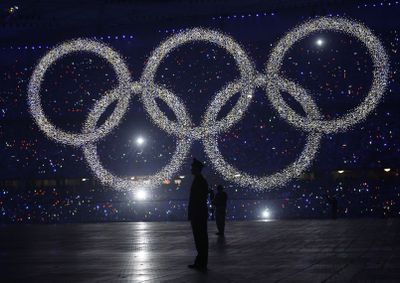What did you expect?
Opening ceremony big, elaborate

BEIJING – A triumphant China kicked off the 2008 Olympic Games Friday evening with an extravagant opening ceremony that chronicled the country’s 5,000-year history and temporarily drew attention away from the months of controversy leading up to the quadrennial event.
A day that began ominously with hazy skies took on a magical feel at the appointed hour of 8:08 p.m. Cheering crowds watched in awe inside the famed Beijing National Stadium, known as the “Bird’s Nest,” as thousands of performers began to drum, dance and march in perfect synchronicity.
Everything about the elaborate four-hour affair spoke to the scale of these Olympics, worthy of a host nation of 1.3 billion people: more than 91,000 audience members, 15,000 performers and 29,000 fireworks feted the 16,000 athletes from some 200 nations and regions who have gathered here to compete.
Organizers have kept the cost of the ceremony a secret, but estimates range from $100 to $300 million. Even the lower figure would put the bill at twice the cost of the opening ceremony at the 2004 Athens Games.
The ceremony was predicted to be the most watched television event in history, with 2.3 billion viewers tuning in live, according to research firm MindShare. Because the ceremony won’t be broadcast live in the United States, American viewers had to wait until 8 p.m. East Coast time to watch on NBC.
The 29th Olympiad from the beginning has been a political as well as an athletic event. In the seven years the country has been preparing for this day, China’s leaders have faced controversy over their involvement in Darfur, China’s rule over Tibet, media and religious freedoms and other human rights issues. Many world leaders struggled with whether to attend, but in the end about 80 – including President Bush – came.
“The historic moment we have long awaited is arriving,” Chinese President Hu Jintao told them earlier in the day. “The world has never needed mutual understanding, mutual toleration and mutual cooperation as much as it does today.”
By some measures, the first day of the 2008 Beijing Olympics – in which China has invested $43 billion – could be considered a great success.
The ceremony was choreographed by Zhang Yimou, director of “House of Flying Daggers” and “Hero,” and was intended to evoke romance and a “wow” factor, organizers said. There were fireworks in the shape of footprints that erupted in succession across the night sky over Beijing, creating the image of a shimmering trail above the metropolis that ended at National Stadium. Thousands of drummers moved in perfect unison. There were also flying Apsaras, a Hindu mythological character found in China’s most famous Buddhist cave paintings.
Performers rolling on rice paper created calligraphy with their bodies.
Noticeably absent from the celebration of China’s history was any reference to Mao Zedong, founder of the Communist state.
Unlike other Olympics, when nations have marched in alphabetical order, the order of the procession of the athletes marching in was determined by the number of strokes in the first character of the Chinese version of their countries’ names. The procession began about 80 minutes into the ceremonies, which culminated with the lighting of the Olympic cauldron.
At the end of the ceremony, eight former Chinese Olympians carried a torch through the final legs of a relay that had spanned the globe and several months.
Shortly after midnight, gymnast and torchbearer Li Ning, famous for winning six medals – three gold, two silver, and a bronze – at the 1984 Los Angeles games, was hoisted above spectators’ heads by ropes. Suspended in air, he circled around the stadium before using the torch he held to ignite the massive cauldron that will burn for the duration of the games.
Other aspects of the opening day remained out of China’s control. The weather, for instance.
For years, China has been taking measures to reduce pollutants in the air. It has shut down factories at great cost to domestic companies and imposed restrictions on the number of cars on the streets. But instead of blue skies Friday, a murky haze hung over the city all day.
The games have highlighted the growing inequality between China’s urban rich and rural poor – with resources, including construction materials, being diverted from other parts of the country in preparation for the games. While China took pains to offer a number of discounted tickets to Olympic events, hotel and transportation prices are so high that the vast majority of its population cannot afford to attend.
The area around the National Stadium was roped off to ordinary citizens. Colorful search lights and helicopters flew overhead.